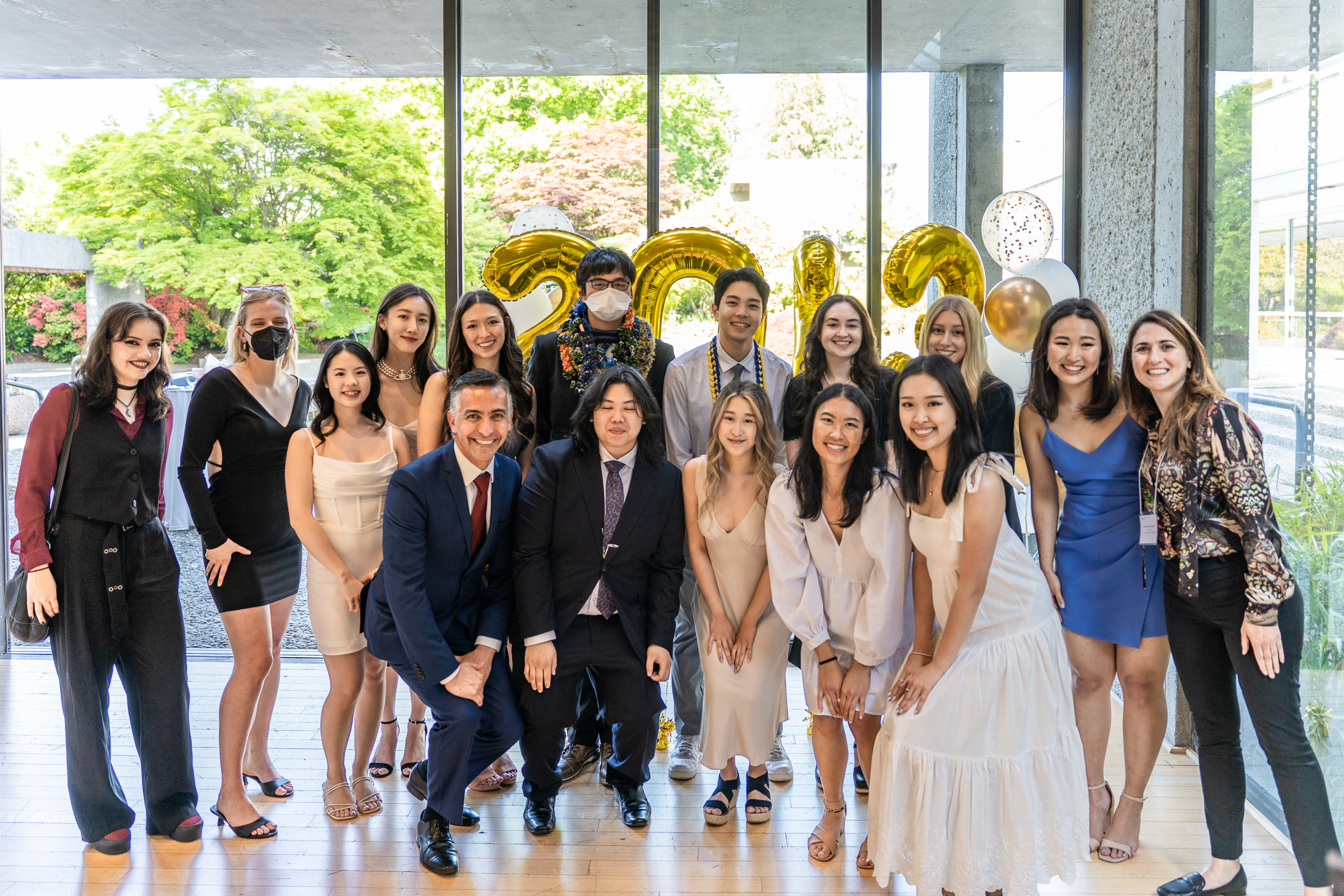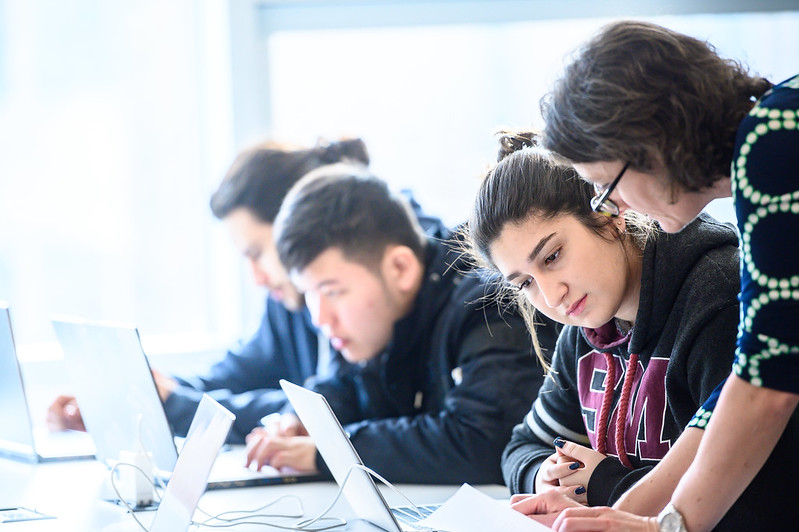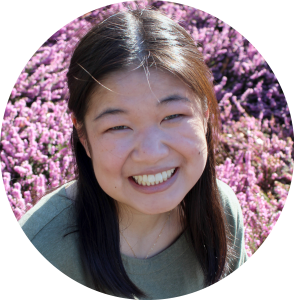

As a Class of 2021 graduate, Emma shares the unique academic experience she had as a Bachelor of Media Studies student with interests in anthropology, how it led to professional experiences in archiving and storytelling, and her current graduate studies in folklore.
Discovering the Bachelor of Media Studies Program
When Emma, who is originally from California, was looking for universities, she had not at first considered studying abroad. However, her father, who is from British Columbia, encouraged her to apply to Canadian schools. When Emma was searching for programs that offered opportunities for her to explore her passions in diverse storytelling forms, writing, and art; she was drawn to the UBC Bachelor of Media Studies program located in Vancouver, Canada for its unique interdisciplinary approach. Emma was excited to study her passions in a province which holds many significant memories for her family!
Studying the interrelations between media, culture, and society in storytelling traditions
Throughout her studies at UBC, Emma expanded her interest in storytelling by complimenting her studies in media with courses in anthropology– finding connections between two seemingly contrasting disciplines, and developing artistic skills and theoretical knowledge in various storytelling forms – focusing on the thematic topic of representation.
Emma first developed an interest in representation through learning about the issues with representation and its complexity in the field of journalism today. In the BMS Year 1 Core Courses, ASTU 100: 1st Year CAP Seminar, JRNL 100: New Media and Society, and an anthropology elective, ANTH 100: Introduction to Cultural Anthropology, she began to explore her interests in the interrelations between society, culture and media in storytelling traditions.
In the BMS Core Course VISA 210: Digital Arts, Emma approached art through philosophical and theoretical discussions around media and created artworks that explored themes of reality, representation and simulation. For example, one of her works, “Chains,” is a video-based on Baudrillard’s concept of the hyperreal, in which people are only ever in contact with remediations of reality, as well as Martha Rosler’s “Semiotics of the Kitchen.” To create the piece, she filmed herself cutting an onion and then filmed that video playing on a television screen over and over until the original work was unrecognizable. Whether it was through academic research or creative art practices, Emma’s aspirations to investigate the complexity of representation in media threaded through all the courses she took.
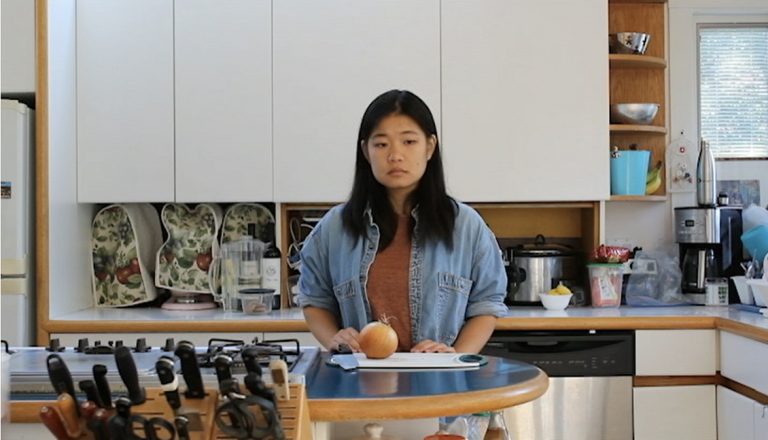

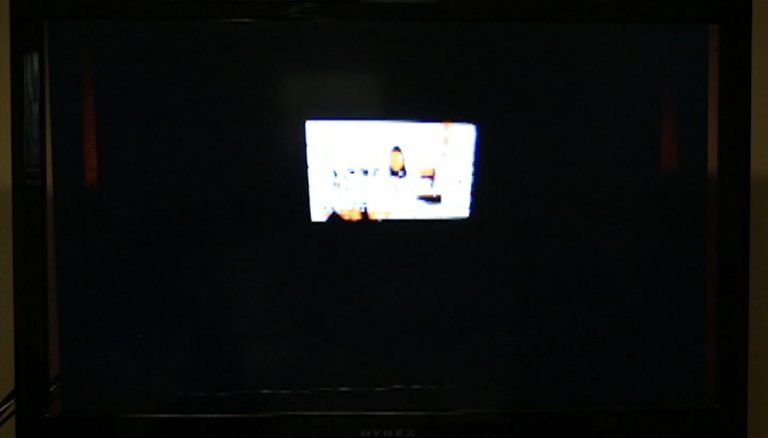

The foundational video (top) and final remediation of it (bottom) from “Chains.”
Emma shared that media theory concepts studied in the BMS Core Courses, ENGL 232: Approaches to Media Studies and ENGL 332: Approaches to Media History, naturally aligned with her anthropology courses, where she learned that media are “inherently related” to cultures. Emma applied her knowledge from media studies and anthropology in writing an academic essay, “Reflections of the Anthropocene in Immersive Art” published on UBC’s Beacon: Journal of Media Studies. In the essay, Emma analyzes an art installation, Yayoi Kusama’s Infinity Mirrored Room – The Souls of Millions of Light Years Away (2013), as a reflective medium for portraying the Anthropocene, the human impact and desire to grasp environment beyond one’s comprehension, the space—the galaxy atmospheric infinity room—beyond Earth.
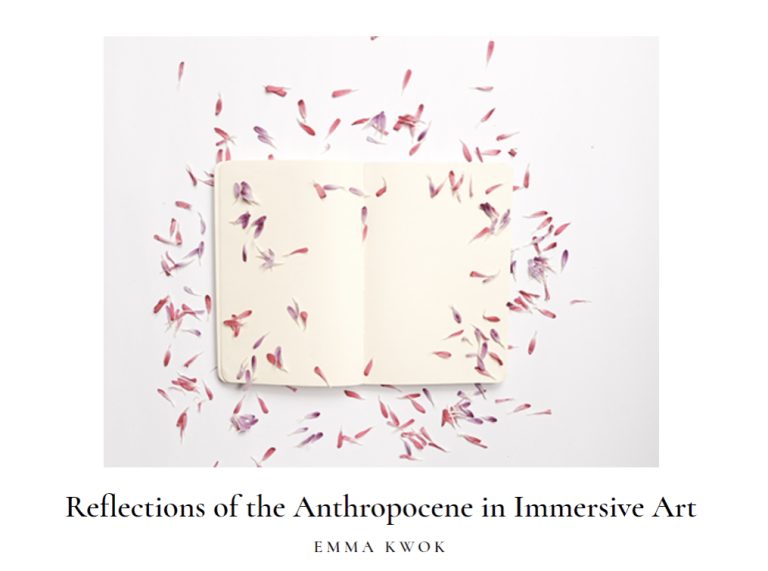

Emma’s essay in the inaugural volume of Beacon, an online journal.
Through pursuing the Go Global exchange opportunity that’s available to BMS students at the University of Edinburgh in her third year, Emma delved deeper into what she perceived as the “convergence of media studies and anthropology” in Scottish ethnology. She learned that anthropology and media studies both highlight the materiality of communication, and that media is inherently entangled with tradition, in the sense that tradition is the culture that is carried from the past, into the present, for the future. To Emma, media is what carries culture. For example, the temporal phrase “half-two” is arguably a medium carrying knowledge particular to the people Emma met in Edinburgh, brought from past experiences of hearing and saying “half-two” into the present, in the expectation of being understood. Emma, however, found the phrase confusing and strange, because she is used to “two-thirty.” Words, as media, are inherently entangled with tradition, or the transmission of culture.
“Academic disciplines often seem to maintain distance from one another. Their subject matter (such as media and culture), however, frequently overlaps. Methods and theories from media studies can help illuminate anthropological research and vice versa.” – Emma Kwok
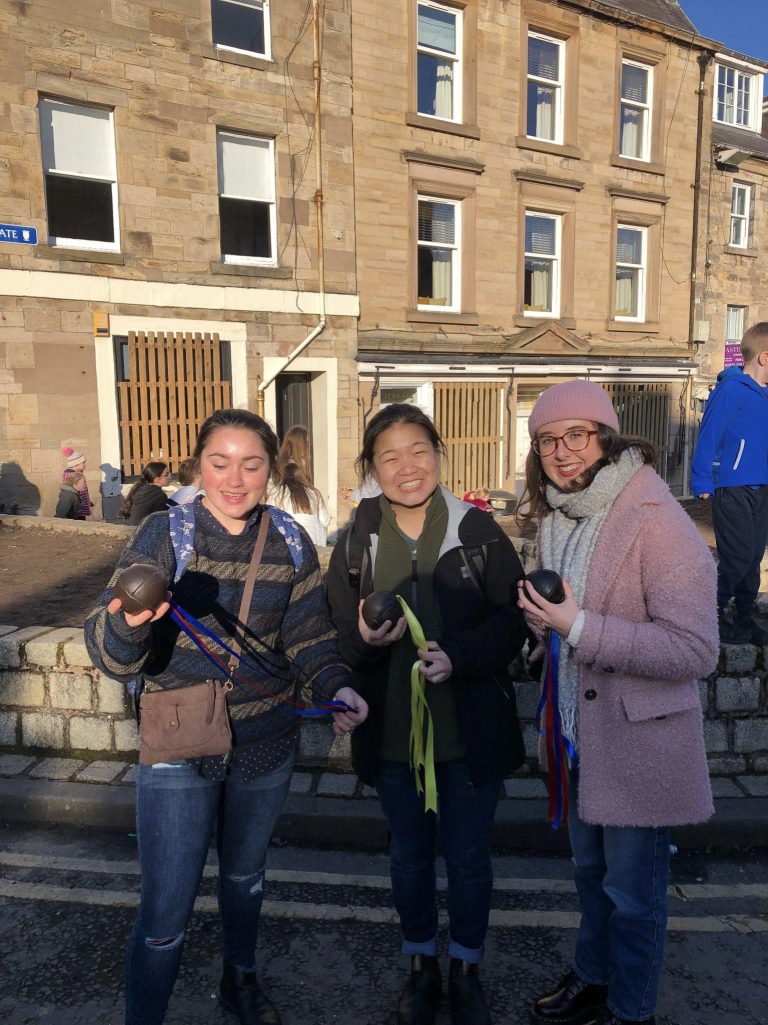

Emma and her classmates take a break while researching an annual ball game in Jedburgh, a town in the Scottish Borders.
Academic Interests Lead to Professional Experiences in the Field
Emma’s unique academic journey studying Media Studies and a Minor in Anthropology at UBC opened doors to new passions, adventures, and work opportunities in the field.
Emma interned as a field-trip designer at the Montalvo Arts Center in Saratoga, California, an organization centred on building intercultural connections through the arts. Then, she participated in Writing Memories, a student initiative at UBC, as a volunteer for interviewing and recording life experiences of senior citizens in Vancouver. Through this opportunity, Emma discovered the values of local oral history restoration. Emma continuously searched for professional and academic opportunities to pursue her aspirations in storytelling, which resonated with her passion for highlighting the importance of representation in preserving narratives and telling cultural stories. During her final year at UBC, she was an archival intern for the 1947 Partition Archive in Berkeley, California. Emma documented personal narratives of people from around the world, who have experienced the division of the British Raj into India and Pakistan and its repercussions.
Emma is now continuing to pursue her academic interests at Memorial University of Newfoundland. Pursuing a master’s degree in folklore, Emma hopes to help build spaces where marginalized voices can be amplified, and people who are often overlooked can be represented by and for themselves. Although folklore may appear distant to today’s digital media landscape, Emma describes the discipline to be “a neighbour to both media studies and anthropology”. Emma hopes to research and implement creative practices for embracing new media and folklore and bring new perspectives.
Leaving Her Footprints: Advice for Prospective and Current BMS Students
Emma shared that one of her favourite parts of the BMS was the cohort-based style of the program where she was able to make close friends and learn from her peers. She discovered that within her cohort, there were peers from various backgrounds with unique interests—some more interested in creative works and others intrigued by the theoretical approaches.
Emma emphasized that every student’s path is special, and encourages current and prospective students to try to expand their comfort zone, and try out all the opportunities that are built in the BMS program like going on Go Global exchange.
Highlighting the importance of empathy for oneself and others in destining the university journey, Emma encourages her peers to become good listeners. Emma emphasizes that listening and caring for oneself and others is important in maintaining a healthy and balanced university lifestyle.
“UBC’s BMS program helped me grow a greater awareness of the frameworks through which people understand reality. What I learned inspired me to become more empathetic and to dream of ways to build a more compassionate world.” – Emma Kwok
To view more of Emma’s work, please visit her website or social media page:
https://emmaokwok.wixsite.com/eport
https://www.linkedin.com/in/emma-kwok-18810b15b/.

